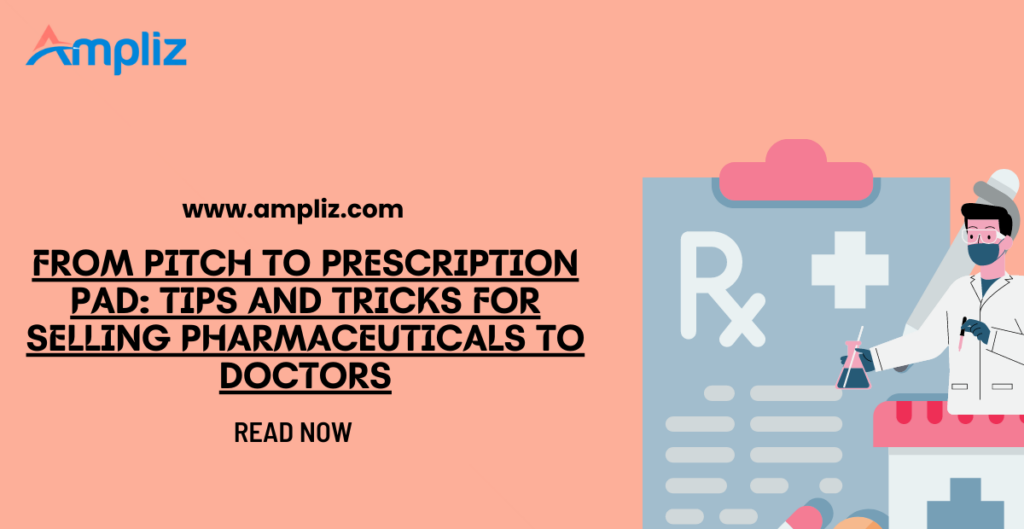Are you tired of selling pharmaceuticals to doctors with wrong selling techniques? How was your last sales meeting with the doctor?
Did he show any interest in your product or just listened for the sake of listening to you as you were there?
We know how demotivating it feels, after waiting for a couple of hours in the waiting room when you get into his room all you get to see is the uninterested face of the doctor.
You also don’t have many opportunities to meet the doctor and whenever you meet him you don’t have enough time because of the tight schedule of doctors.
So what’s the key?
The secret of B2B pharmaceutical marketing lies in making the best of whatever time you have to talk to your doctor and convince him.
How can you do that?
There are some ways for making your doctor interested in your pitch and product. But before we discuss them, let’s discuss how you reach out to them.
Because like doctors, his/her gatekeeper is also busy taking time to talk to you and gives you permission to meet the doctor.
Let’s see how to sell pharmaceuticals to doctors and physicians in the USA.
How to Selling Pharmaceutical to Doctors?
There are two types of pharmaceutical marketing strategies
- Convince the office manager to set the meeting with the doctor
- Selling pharmaceuticals to doctors
Let’s see one of the pharmaceutical selling techniques how you can convince the office manager to set a meeting with the doctor.
Convince the office Manager to Set up a Meeting with the Doctor
Doctors have become very choosy when it comes to having a meeting with sales reps. And that’s why they don’t allow the office manager to enter his room. If the sales reps set some criteria of the medical officer suggested by the doctor then only they set a meeting with the doctor.
And that’s why as a pharmaceutical sales rep, you have to put effort into convincing the office manager too. Let’s see how you can do that.
1. Know the right time to meet the office manager
Like your prospective physicians, the office manager is also busy. He/she is the person who sets the doctor’s schedule and serves as a gatekeeper between the doctor and the salesperson.
First thing you should keep in mind while reaching out to this office manager is the right time of pitching. Yes, you should never reach out to them before or after lunch.
The second important thing that you should remember is to pitch them with a very short pitch. A short and effective pitch is the key. You should be clear in which ways your medicine is different from others. You must have a strong answer to the” Why your medicine?”
2. Cater a free Meal
Many times doctor’s offices are heavily scheduled, and employees hardly get time to have their food. In that case, you can offer them either free lunch or breakfast and in return for it, you can ask for their time for a small presentation.
You can also give them some time to ask some questions and clear doubts regarding your product.
3. Provide freebies
Providing free marketing literature, product sample, or promotional items can also contribute towards getting a yes from the office manager. Your marketing literature should mention the USP of your product. You can give promotional items like pens, notebooks, and calendars which they can keep around and use.
These strategies will help you to pass through gatekeepers and get into the doctor’s room. Now when you get into the doctor’s room you have to make the most of this time.
Because as per the research, doctors have reduced the number of visits per year. Because they feel the sales reps are very salesy, and share only stale and biased information, and this wastes their time.
In such an atmosphere, you must be very particular about your pitch. You need to prepare your pitch very strategically so that doctors feel worthy of the time they have spared with you.
Let’s see how you can pitch them so that they can’t resist themselves to take an interest in you.
1.Talk for the betterment of the patients
Doctors have reported that, when salespeople come to meet them, they always talk about how doctors can earn more money, and rarely talk about the betterment of the patients.
Doctors don’t like this approach. As per the report they have said that they are doctors, not entrepreneurs who always think about making money.
And that’s why whenever you meet a doctor to market or sell your pharmaceutical product, always talk about how the drug is beneficial to patients, and doctors help them to recover faster.
2. Share new information with the physician
As per a recent study, physicians feel that sales reps waste their time by showing them stale information.
That’s why you need to research more and show and discuss only those things which might be new to them. They should feel that they have got value for the time they have spent.
Discuss the features and benefits of your medicine but do not sound salesy and biased. You need to discuss this in such a way the doctors get some important information that might be new to them and help them in their treatment.
In the urge of selling your medicine don’t forget to be honest. Be honest about your drug, and don’t make any false promises.
3. Visualize important information
Gone are the days when people used to use pamphlets and brochures to share important information. Now people prefer a digital mode of getting information. So as the doctors.
As per the study, doctors would like to have seen the important details of the product on the tablet. So you have to keep the one with you.
You can show various stats, graphs, and videos through the tablet. This will enhance your presentation and make it more effective and memorable.
4. Go beyond the pill
Whether you are Sell pharmaceuticals to doctors online or any other medical device, one thing that you should keep in mind is forming a trustworthy relationship with a doctor.
This would only differentiate you from your competitors. You Should not focus on sales but rather on educating them about your product and others available in the market.
You have to go beyond selling. For doctors, their patients’ timely recovery and their reputation are more important than making money. And that’s why you also should focus on that.
What you should know before Selling Pharmaceuticals to Doctors?
The above-mentioned strategies work only when you are fully prepared before you meet the doctor. Let’s see what things you must be aware of before visiting the doctor.
- Drug information
- Updated Info
- Competing products
- Personality of doctors
- You know your company well and the company is also known to doctors
- You should be aware of the USP of the drug
- You should be aware of the disease your drug is going to cure
What do your prospective doctors expect from you?
Convincing your doctor becomes easy when you know what they expect from you. Your doctor expects you to have
- An effective drug
- Information related to the drug
- Available dosage form
- The price of the drug
- Brochures
- Conferences
- Services
- Frequent visits
Key Elements of Successful Communication to Sell Pharmaceutical Products
Let’s see what are the important elements your prospective doctor should have.
- Question: Allow and encourage them to ask the question to have better clarity of your products.
- Feedback: Ask for confirmation, and check and reconfirm
- Visual ads: Use various visuals in your presentation, like images and videos to enhance the effectiveness of the presentation
- Clear assumptions: Verify your way of communication is understood by them
- Don’t assume what others know: Don’t assume that your knowledge is familiar to the receiver. Explain to them as if they know nothing, or ask before explaining. This refers to technical terms, background principle knowledge, and so on.
- Set a frame before getting into detailing: Before you give detailed information try to introduce them to the topic, and give an overview.
- Give/get sufficient information: Give as much information as you can related to the drug and useful to them. Don’t over-give or under-give.
How HIPAA Regulations in Relevance to Selling Pharmaceuticals to Physicians?
HIPAA (Health Insurance Portability and Accountability Act) is a crucial regulation that impacts the selling of pharmaceuticals to doctors.
This regulation plays a fundamental role in safeguarding patients’ privacy rights and ensures the security of their confidential healthcare information.
Firstly, HIPAA mandates strict guidelines for maintaining patient confidentiality. When pharmaceutical companies sell their products to doctors, they often require access to patients’ medical records or personal health information to ensure proper prescribing and treatment decisions.
However, under HIPAA regulations in relevance to selling pharmaceuticals to physicians, these companies must adhere to stringent standards when handling such sensitive data.
Pharmaceutical companies are obligated not only to protect the privacy of patient information but also limit its use solely for intended purposes.
They must obtain written consent from patients before accessing or using any identifiable health data. Moreover, they have an obligation to implement robust security measures like encryption and secure storage systems while transmitting or storing this information electronically.
Additionally, HIPAA grants patients certain rights regarding their health records. It allows them access to their own medical data upon request and gives them control over how it may be shared with third parties – including pharmaceutical representatives who seek insights into patient needs for targeted marketing purposes.
When selling pharmaceuticals directly to doctors, companies need prior authorization from both physicians and patients if any personalized patient data will be involved during sales interactions.
This ensures compliance with HIPAA’s “minimum necessary” principle which restricts unnecessary disclosure of protected health information without valid reasons.
Furthermore, HIPAA regulations prohibit pharmaceutical sales representatives from discussing specific patients’ details with doctors unless granted explicit permission by those individuals.
These restrictions prevent unauthorized disclosures that could compromise patient trust as well as violate privacy laws.
To navigate these regulatory requirements effectively while still promoting their products ethically, pharmaceutical sales teams often focus on educating healthcare providers about general trends rather than relying on individualized patient cases during promotional activities.
In summary, HIPAA imposes stringent obligations on the selling of pharmaceuticals directly to doctors by protecting patient privacy, limiting the use and disclosure of personal health information, granting patients control over their own data, and prohibiting discussions about specific patient cases without proper consent.
Complying with these HIPAA regulations selling pharmaceuticals to physicians ensures that pharmaceutical companies maintain ethical practices while offering valuable products to healthcare professionals for the benefit of patients’ overall care.
Conclusion
Selling pharmaceuticals to doctors is quite challenging. From getting a doctor’s appointment to convincing them to buy your drug, every process requires a strategic approach. To help you out in this journey, we have listed some steps that you can follow and make the best of your marketing and selling efforts.




